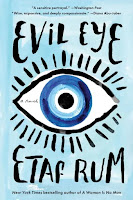While Heritage Months have disappeared from U.S. government websites and some college websites as well, there's no law, yet, against individuals observing them. So I am.
This month is Arab American Heritage Month. As just a general reader, I'm not aware of having run into or read much by Arab American authors. I have no idea why, because there are certainly plenty of them out there. In fact, I can direct you to a couple of lists of books by Arab American authors.
The Brookline Booksmith site says that Arab American Heritage Month has only existed since 2021, which might account for me not being more familiar with these authors. Heritage months truly do provide opportunities to promote groups, and those groups that have had heritage months for a longer time may have a higher profile.
The two books by Arab American writers that I read this month were selected because 1. the content descriptions interested me in some way, and 2. I could get them. Coincidentally, they are both written by Palestinian American writers and deal with Palestinian American experience. Times being what they are that ended up being a good thing for me. I knew as close to nothing about the Palestinian situation as it's possible to know and still be alive in the twenty-first century. Now I know a little more.
Evil Eye
Evil Eye by Etaf Rum is a highly regarded book that has received a great deal of positive attention. I mention this to encourage others to read it even though stylistically it was not my favorite kind of book. I found it rather interior directed, a lot of telling. As an older woman reader, I also found it to be a little bit of a "diary of a mad Palestinian American housewife." By which I mean it deals with issues I've seen in books about women in the past. What this may mean is that Rum is writing about problems middle class first-generation American women face now that were new for other middle class American women a generation or two ago.
Main character Yara married to escape her parents' home in Brooklyn. Marrying to escape family is not that unusual in literature and probably not in life. What is unique here is that Yara married a man she barely knew in an arranged marriage. She also suffers from generational trauma. Her grandmother lost her home in Palestine and lived her life in a camp. Her mother came to America with a new husband, expecting a life as a singer, not a life tied to six children and a husband who abused her.
Otherwise, like many other women, Yara doesn't want to lose her job and only be a housewife. She wants the same freedoms her husband has. She fears being unable to escape her childhood and becoming her mother. She's miserable and struggling to do more than accept she deserves to be miserable.
As I was reading Evil Eye, my basic feeling was that unhappy marriages transcend culture.
Behind You Is the Sea
Behind You Is the Sea is another highly regarded book. It's described as an episodic novel, but I found it more to be interconnected short stories. Yeah, that's nitpicking. Even though I occasionally didn't see how a story/chapter was connected, it didn't matter, because they were all terrific.
What's more, there are characters and situations in Behind You Is the Sea that are similar to what we see in Evil Eye--a married couple who reminded me of Yara and her husband, though there's something very different going on with them, as well as an immigrant father similar to Yara's. It's as if both authors are writing about a culture they know, and I don't.
Yeah, that's what happens when you read books by authors from other cultures.
At the same time, both books involve cultures I am familiar with. The unhappy marriage in Evil Eye. The wedding reception, the mother dealing with a school issue, the teenager involved with theater in Behind You Is the Sea. These are all things I've heard about before, if not actually experienced, but they're different here, too.
And that is the pleasure in reading books from authors who come out of cultures different from one's own. In addition to experiencing something totally different, you sometimes get to experience a new twist on something that isn't different.
Behind You Is the Sea's title is part of a quote attributed to an 8th century Muslim general. "Behind you is the sea. Before you, the enemy." There's more to it you can read for yourself. It was kind of grim for the situation the general was dealing with, but, personally, I find it a profound metaphor for life. In Behind You Is the Sea a character says something about Arabic being poetic, and there is some lovely language in this book, the title being just one example. Lovely language, in my experience, sometimes weighs a narrative down. Not the case here at all.
All told, my Arab American reading this month was very satisfying. My only regret is that I didn't have time to do more of it. I'm on to May and another heritage month.
UPDATE 5/24/25: I took a workshop this past Thursday on novels-in-stories. I wonder if Behind You Is the Sea would fall under that umbrella.


No comments:
Post a Comment